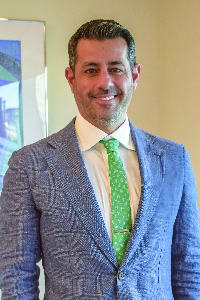When Hearing Aids Are No Longer Sufficient
- Category: Health
- Published: Wednesday, 23 February 2022 12:40
- Joanne Wallenstein
 Hearing aids have undeniably been a boon for many patients over the years. But as many of those patients will attest, hearing aids do a very good job making things louder – but they can fall short in making things clearer.
Hearing aids have undeniably been a boon for many patients over the years. But as many of those patients will attest, hearing aids do a very good job making things louder – but they can fall short in making things clearer.
A common complaint about using hearing aids is that it can be difficult to separate speech from the ambient background “noise,” such as in a movie theater. This was the situation faced by one of my older patients who used a hearing aid. He is a practicing attorney who was beginning to feel he could no longer do his job as effectively as he had in the courtroom, due to other people talking and other background sounds. As a result, he tended to work primarily from his office, feeling that he was being pushed into retirement by his loss of hearing.
Fortunately he was the right candidate for a cochlear implantation surgery. The difference his cochlear implant made was huge – at work, at home, at restaurants, and so on. He thanked me profusely in what proved to be a very emotional moment for both of us.
To rewind a bit: the cochlea is a part of the inner ear that is involved with hearing. The implant itself is a small electronic device that electrically stimulates the cochlear nerve; its external part sits behind the ear and picks up sounds with a microphone. Those sounds are then processed and transmitted to the implant’s internal part. That part, placed under the skin behind the ear, includes a thin wire and small electrodes that lead to the cochlea in the inner ear. The wire sends signals to the cochlear nerve, which in turn sends sound information to the brain to produce a hearing sensation, essentially duplicating what a person’s cochlea normally does.
That part, placed under the skin behind the ear, includes a thin wire and small electrodes that lead to the cochlea in the inner ear. The wire sends signals to the cochlear nerve, which in turn sends sound information to the brain to produce a hearing sensation, essentially duplicating what a person’s cochlea normally does.
It is important to note that this procedure, which typically takes about two hours, does not “recover” lost hearing, but it can improve the patient’s hearing experience. And one should not expect to immediately return to hearing things as well as they did earlier in life. Some retraining of the brain is required to make sense of the sounds that are suddenly detectable again. This can take weeks, even months, but ultimately the clarity of speech that can be detected will be much better.
Cochlear Implant Candidacy
The ideal cochlear implantation candidate is one with significant – that is, moderate to profound – hearing loss, and who, having used hearing aids in the past, no longer derives benefit from them. And while many of us may associate such hearing loss with age, which can definitely be a factor, you may be surprised to learn that patients as young as eight months old can benefit from the procedure.
To determine the severity of a patient’s hearing loss, a series of tests are conducted. These include a pure tone audiogram – familiar to most of us as the “when you hear the tone, raise your hand” exercise – and a pair of audiometry tests. The first of those involves your being asked to repeat a list of words to determine the lowest volume at which you can hear speech.
The second audiometry test is conducted in a similar fashion, but is used to determine how well you can understand speech at a certain level. Typically, someone with significant hearing loss will have difficulty hearing sibilant, high-frequency sounds like “s,” “sh,” “ch” and “j.” As research continues into addressing hearing loss, so too will forward strides be made in auditory-related surgery. But for countless individuals, cochlear implantation procedures have made all the difference. If you have concerns about your own hearing, get in touch with an audiologist, or consult with your physician about your options.
As research continues into addressing hearing loss, so too will forward strides be made in auditory-related surgery. But for countless individuals, cochlear implantation procedures have made all the difference. If you have concerns about your own hearing, get in touch with an audiologist, or consult with your physician about your options.
Dr. Brian D. Nicholas is the Director of Hearing and Balance at White Plains Hospital and sees patients at 122 Maple Avenue in White Plains and at 21 Laurel Avenue, Suite 290, in Cornwall. To make an appointment, call 914-849-3755.














